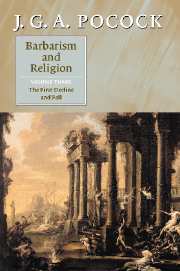Book contents
- Frontmatter
- Contents
- Acknowledgements
- Note on usages
- List of abbreviations
- Introduction
- PROLOGUE
- 1 Gibbon's first volume: the problem of the Antonine moment
- PART I THE FIRST DECLINE AND FALL: ANCIENT PERCEPTIONS
- 2 Alibi quam Romae: the Tacitean narrative
- 3 The Gracchan explanation: Appian of Alexandria and the unknown historian
- 4 The construction of Christian empire
- PART II THE AMBIVALENCE AND SURVIVAL OF CHRISTIAN EMPIRE
- PART III THE HUMANIST CONSTRUCTION OF DECLINE AND FALL
- PART IV EXTENSIVE MONARCHY AND ROMAN HISTORY
- PART V REPUBLIC AND EMPIRE: THE ENLIGHTENED NARRATIVE
- PART VI GIBBON AND THE STRUCTURE OF DECLINE
- EPILOGUE
- Bibliography of works cited
- Index
4 - The construction of Christian empire
Published online by Cambridge University Press: 15 December 2009
- Frontmatter
- Contents
- Acknowledgements
- Note on usages
- List of abbreviations
- Introduction
- PROLOGUE
- 1 Gibbon's first volume: the problem of the Antonine moment
- PART I THE FIRST DECLINE AND FALL: ANCIENT PERCEPTIONS
- 2 Alibi quam Romae: the Tacitean narrative
- 3 The Gracchan explanation: Appian of Alexandria and the unknown historian
- 4 The construction of Christian empire
- PART II THE AMBIVALENCE AND SURVIVAL OF CHRISTIAN EMPIRE
- PART III THE HUMANIST CONSTRUCTION OF DECLINE AND FALL
- PART IV EXTENSIVE MONARCHY AND ROMAN HISTORY
- PART V REPUBLIC AND EMPIRE: THE ENLIGHTENED NARRATIVE
- PART VI GIBBON AND THE STRUCTURE OF DECLINE
- EPILOGUE
- Bibliography of works cited
- Index
Summary
We are now possessed of two narratives that were to be crucial in the making of Gibbon's account of the disintegration of the Antonine monarchy. The Tacitean narrative portrayed the Augustan principate as imperfect and unstable, exposed to interventions by the armies that moved power away from control by the governing elites at Rome; the ‘Gracchan explanation’ set out in the narrative of Appian surveyed the whole course of the Roman civil wars, down to the victory of Augustus, as the product of the republic's inability to satisfy its growing armies with grants of Italian land. If the two narratives could be linked, the principate would appear an imperfect solution to the problems that had destroyed the republic, and there would be a pattern of explanations capable of dealing with the crises of the first century before Christ and the first, perhaps also the second, centuries after him.
This explanation could be extended – as we know before pursuing Gibbon's narrative further, because it is already implanted in our minds – to deal with ‘the decline and fall of the Roman empire’ conceived as the conquest and settlement of Roman provinces by invading barbarians. The intervention of the armies in the recurrent crises of succession to the principate could be made to seem destructive of their military discipline and their control by the imperial state, so that they became increasingly incapable of resisting the fluctuating but persistent barbarian pressure on the frontiers.
- Type
- Chapter
- Information
- Barbarism and Religion , pp. 61 - 74Publisher: Cambridge University PressPrint publication year: 2003

